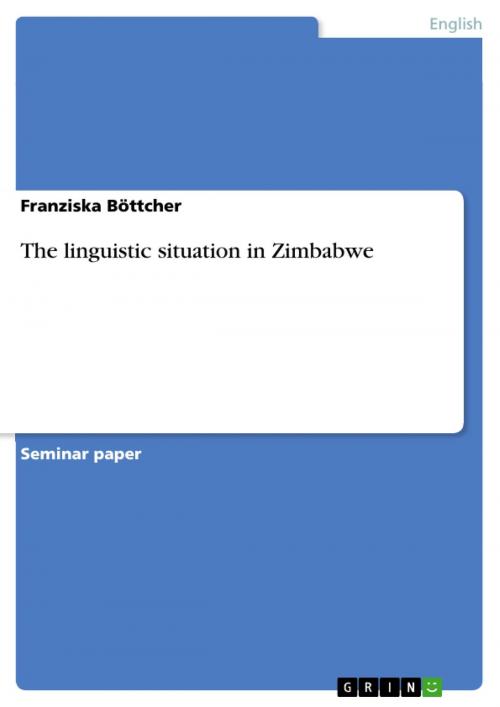| Author: | Franziska Böttcher | ISBN: | 9783638679022 |
| Publisher: | GRIN Publishing | Publication: | May 15, 2007 |
| Imprint: | GRIN Publishing | Language: | English |
| Author: | Franziska Böttcher |
| ISBN: | 9783638679022 |
| Publisher: | GRIN Publishing |
| Publication: | May 15, 2007 |
| Imprint: | GRIN Publishing |
| Language: | English |
Seminar paper from the year 2002 in the subject English Language and Literature Studies - Linguistics, grade: 1,7, Humboldt-University of Berlin (Institut für Anglistik / Amerikanistik), course: HS: Southern Hemisphere English, 12 Literaturquellen, 9 Internetquellen entries in the bibliography, language: English, abstract: At the beginning of our seminar with the title 'Southern Hemisphere English' we agreed on a short definition of what we see as linguistic or language situation. The linguistic situation describes the ethnic and / or regional distribution as well as the social and functional distribution and hierarchy of the languages or varieties that are used for communication in a certain, generally administrative territory, according to prevalent ethnic, political, socio-economic and cultural conditions. It is always the result of historical processes and largely depends on the language policy adopted in the territory. I start the paper with a short look at Zimbabwe's colonial history. Later on I examine the linguistic situation and the kind of language policy existing in Zimbabwe. In this context I talk about the languages spoken in Zimbabwe, their status and functions and the speakers' attitudes towards those languages. Furthermore, I give a short summary of the results of the Harare 1997 Intergovernmental Conference on Language Policies in Africa. Finally, I try to give an impression of some of the peculiarities of the variety of English spoken in Zimbabwe. Due to the contact with and the influence of the indigenous language Shona there is some notable lexical, syntactical as well as phonological variation. Other features I deal with are the social varieties of English in Zimbabwe and the role of English in Zimbabwean literature. In summary, this paper aims at illustrating the linguistic situation in this former British colony by looking at the legal regulations (de jure situation), concerning the status and functions of the languages spoken most widely, as well as the de facto situation and the relation between the two. Apart from that, I also want to give an impression of the kind of English spoken in Zimbabwe and maybe find out whether something like a Zimbabwean variety of English exists.
Seminar paper from the year 2002 in the subject English Language and Literature Studies - Linguistics, grade: 1,7, Humboldt-University of Berlin (Institut für Anglistik / Amerikanistik), course: HS: Southern Hemisphere English, 12 Literaturquellen, 9 Internetquellen entries in the bibliography, language: English, abstract: At the beginning of our seminar with the title 'Southern Hemisphere English' we agreed on a short definition of what we see as linguistic or language situation. The linguistic situation describes the ethnic and / or regional distribution as well as the social and functional distribution and hierarchy of the languages or varieties that are used for communication in a certain, generally administrative territory, according to prevalent ethnic, political, socio-economic and cultural conditions. It is always the result of historical processes and largely depends on the language policy adopted in the territory. I start the paper with a short look at Zimbabwe's colonial history. Later on I examine the linguistic situation and the kind of language policy existing in Zimbabwe. In this context I talk about the languages spoken in Zimbabwe, their status and functions and the speakers' attitudes towards those languages. Furthermore, I give a short summary of the results of the Harare 1997 Intergovernmental Conference on Language Policies in Africa. Finally, I try to give an impression of some of the peculiarities of the variety of English spoken in Zimbabwe. Due to the contact with and the influence of the indigenous language Shona there is some notable lexical, syntactical as well as phonological variation. Other features I deal with are the social varieties of English in Zimbabwe and the role of English in Zimbabwean literature. In summary, this paper aims at illustrating the linguistic situation in this former British colony by looking at the legal regulations (de jure situation), concerning the status and functions of the languages spoken most widely, as well as the de facto situation and the relation between the two. Apart from that, I also want to give an impression of the kind of English spoken in Zimbabwe and maybe find out whether something like a Zimbabwean variety of English exists.















